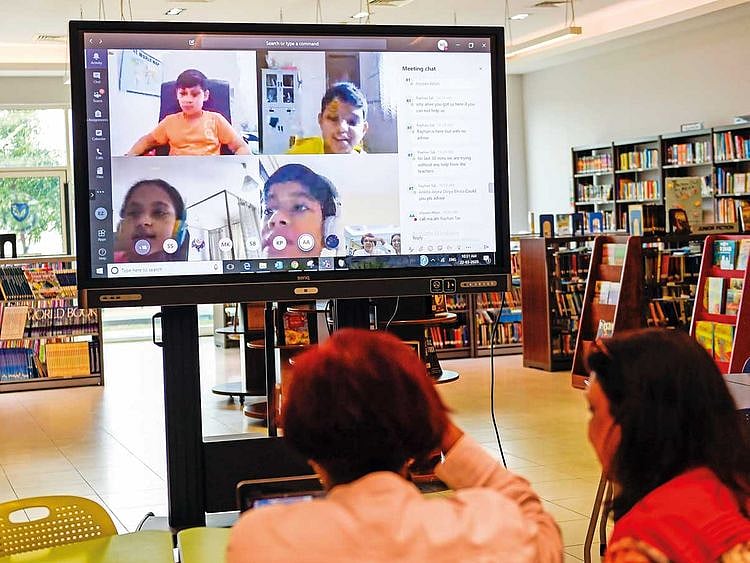With schools and universities shuttered indefinitely to contain the spread of COVID-19, education globally is undergoing major disruptions. According to UNESCO, the nationwide closures are impacting more than 91 per cent of the world’s student population. In response to school closures and to reduce the impact, the UAE Ministry of Education has launched e-learning in all schools and public and private universities — initially for two weeks from March 22 and then extending it until June.
While it’s too early to judge the effects of distance learning on student performance, experts agree that adapting to the e-learning model is the only way forward to maintain continuity of education for over one million students in the UAE.
Here we speak to heads of education institutes in the country to understand how they are working to make the best of the current situation.
A balancing act
The success of any e-learning model, especially at primary and secondary school level, depends on finding the right balance between a self-paced (asynchronous) and a collaborative (synchronous) form of instruction. To facilitate student learning, schools in the UAE have pushed to create a structure, taking the best elements of both.
The Aquila School in Dubai ensures the experience they offer in their learning at home programme is as close to real school as possible.
“This means that the things we do to promote school connectedness, such as two weekly assemblies and daily registration, happen as usual,” says Wayne Howsen, Principal of the school.
“As we develop learning at home, we are introducing more live lessons for the whole class — and then different groups stay online to work with the teacher so that learning can be personalised to individual needs. By doing this we are able to ensure that every child makes as much progress as possible.”
The distance learning platforms at Raffles International School (RIS) are also tailored to the learning needs of different groups of students.
“Microsoft Teams are used at RIS to deliver live lessons and collaborate ideas in secondary,” says Tim Richardson, Principal. “Each of these is supplemented by additional subscriber software and applications to create a comprehensive programme that ensures learning progresses and runs uninterrupted during this time.”
Exploring creative teaching techniques and using interactive graphics, presentations and quizzes are key to creating engaging learning experiences for students, especially for challenging subjects such as maths and sciences, and achieving results, say educators.
Teaching maths and lab-based subjects
Through upskilling, teachers at GEMS Wellington International School have been able to model examples and explain mathematical concepts in detail using a variety of apps available for live interaction.
“We also have one or two student helpers who interact with the teacher and answer probing questions, as well as report back if any students do not understand,” says Geeta Rai, Head of Mathematics at GEMS Wellington International School. “This, alongside helpful video links, enables students to become more confident and resilient. ”
For maths lessons, teachers at The Aquila School are also demonstrating concepts to children remotely. “They then practice on their own — either live with the teacher — or by working independently and submitting their work. More than ever feedback is critical here, so that any misconceptions are addressed quickly to support future learning,” says Howsen.
Global Indian International School (GIIS) in Abu Dhabi is offering virtual laboratory facilities to all of its students digitally, to help minimise disruptions in learning.
“The virtual lab facilities at GIIS allow students to develop their design thinking skills by transforming their screen into a maker space area where the students are trained in various software simulation tools to construct their prototypes,” says Dr Heena Rachh, Principal, GIIS Abu Dhabi.
“These digital labs are available to the students even after school hours, allowing them to research their queries and exhibit their ideas, thus nurturing them to survive the situation in the smartest way.”
Schools in the UAE have also started paying attention to improving the quality of their assessment practices to measure students’ achievement and progress during distance learning.
Teachers at Nibras International School use a variety of summative and formative assessments to ensure that the students understand the concepts in each lesson.
“The assessment procedures vary to include tests, quizzes, presentations, and assignments,” says Daspo Yiappos, Head of Teaching and Learning, Nibras International School.
“Google Classroom has been instrumental in the middle and high school, as it helps streamline formative assessment. This platform is important in helping teachers identify the students who might need more support or extra challenges.”
Faculty training and support
With all learning now online, motivating and empowering teachers, who are working in isolation, with practical guides, technology support, professional development, and course materials is fast becoming a focus for most schools.
“It is important to give structure, support, and time to teachers to be successful in virtual instruction,” says Dr Paul Richards, Superintendent, American School of Dubai (ASD).
“We, at ASD, are using our network of other international schools from all over the world and the research base to learn about the best practices in online learning and create guidelines that teachers can turn to for support.”
In this intense situation it’s also critical for teachers to prioritise their activities to manage expectations and cope with the pressure.
“We support teachers to select the critical parts of the curriculum and allow them to not teach the rest. We are also trying to take everything that is not mission critical off their plates, to enable them to concentrate on student learning,” says Dr Richards.
Sign up for the Daily Briefing
Get the latest news and updates straight to your inbox
Network Links
GN StoreDownload our app
© Al Nisr Publishing LLC 2026. All rights reserved.
